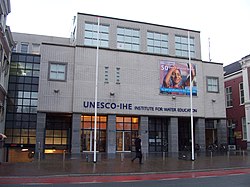UNESCO
UNESCO is the United Nations Educational, Scientific and Cultural Organization (French: [L'Organisation des Nations unies pour l’éducation, la science et la culture] Error: {{Lang}}: text has italic markup (help)). It is an agency of the United Nations (UN).
 United Nations Educational, Scientific and Cultural Organization | |
|---|---|
| 239px | |
| Org type | Agency |
| Head | Khaled El-Enany Director-General of UNESCO |
| Status | Active |
| Established | 16 November 1945[1] |
| Headquarters | Paris, France |
| Website | UNESCO.org |
UNESCO says its purpose, as defined just after the end of World War II, is "to build the defenses of peace in the minds of men and women". It does this by helping nations work together, through education for all, science, and culture. This is supposed to help other nations follow the rule of law and human rights. It also helps promote some freedoms in the UN Charter.[1]
UNESCO has 195 Member countries.[2]
UNESCO tries to achieve what it wants to do through six programs: education, natural sciences, social and human sciences, culture, communication and information. Some projects sponsored by UNESCO are literacy, technical, and teacher-training programmes. UNESCO also decides what will become World Heritage Sites. A World Heritage Site is an important, special, interesting or beautiful place. If a place is a World Heritage Site, the place can not be destroyed, as it can give useful information for the future. The Uluru, for example, gives a lot of information on the culture of Aborigines. UNESCO is also a member of the United Nations Development Group.[3] and works for Millennium Development Goals.
List of directors
| Order | Image | Name | Country | Term |
|---|---|---|---|---|
| 1st | 60px | Julian Huxley | File:Flag of the United Kingdom (3-5).svg United Kingdom | 1946–1948 |
| 2nd | 60px | Jaime Torres Bodet | 22x20px Mexico | 1948–1952 |
| – | 60px | John Wilkinson Taylor | 22x20px United States | acting 1952–1953 |
| 3rd | 60px | Luther Evans | 22x20px United States | 1953–1958 |
| 4th | 60px | Vittorino Veronese | 1958–1961 | |
| 5th | File:René Maheu (France), UNESCO Director General (1961-1974).JPG | René Maheu | File:Flag of France.svg France | acting 1961; 1961–1974 |
| 6th | 60px | Amadou-Mahtar M'Bow | File:Flag of Senegal.svg Senegal | 1974–1987 |
| 7th | 
|
Federico Mayor Zaragoza | 1987–1999 | |
| 8th | 
|
Koïchiro Matsuura | 1999–2009 | |
| 9th | 
|
Irina Bokova | 2009–2017 | |
| 10th | 60px | Audrey Azoulay | File:Flag of France.svg France | 2017– 2025 |
| 11th | 60px | Khaled al-Anani | 2025–Incumbent |
UNESCO Media
UNESCO offices in Brasília.
References
- ↑ 1.0 1.1 "UNESCO History". www.unesco.org. Retrieved 23 April 2010.
- ↑ "Member States | United Nations Educational, Scientific and Cultural Organization". Portal.unesco.org. Retrieved 23 April 2010.
- ↑ "UNDG Members". Undg.org. Archived from the original on 2011-05-11. Retrieved 2011-08-08.
Other websites
| Wikimedia Commons has media related to Lua error in Module:Commons_link at line 62: attempt to index field 'wikibase' (a nil value).. |


